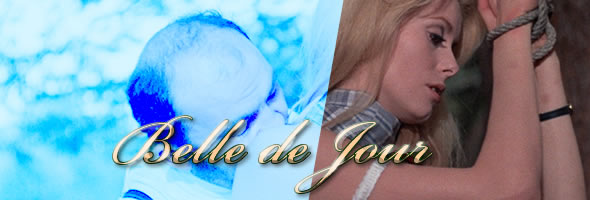
Color, 1967, 101m.
Directed by Luis Buñuel
Starring Catherine Deneuve, Jean Sorel, Michel Piccoli, Genevieve Page, Pierre Clementi, Francoise Fabian, Macha Meril
Criterion (Blu-Ray & DVD) (US RA/R1 HD/NTSC), Studio Canal (Blu-Ray & DVD) (UK/France/Germany/Australia RB/R2 HD/PAL)
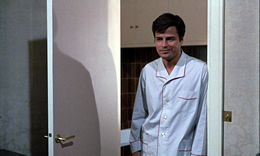 After spending most of the previous decade dabbling in scandalous black-and-white surrealism attacking the conventions of religion and the upper class, director Luis Buñuel startled viewers around the world with the most elegant, colorful, and overtly erotic film in his career: Belle de Jour. Star Catherine Deneuve was becoming an international superstar after her roles in films like Repulsion and The Umbrellas of Cherbourg, and few could resist the idea of her playing a dysfunctional young wife who spends her afternoons selling her body to a peculiar array of clients. However, the film is far more than a titillating tease; it’s a fascinating artistic and psychological experiment whose slippery depictions of fantasy and reality lure receptive audience members back for repeated viewings, each one as beguiling as the last.
After spending most of the previous decade dabbling in scandalous black-and-white surrealism attacking the conventions of religion and the upper class, director Luis Buñuel startled viewers around the world with the most elegant, colorful, and overtly erotic film in his career: Belle de Jour. Star Catherine Deneuve was becoming an international superstar after her roles in films like Repulsion and The Umbrellas of Cherbourg, and few could resist the idea of her playing a dysfunctional young wife who spends her afternoons selling her body to a peculiar array of clients. However, the film is far more than a titillating tease; it’s a fascinating artistic and psychological experiment whose slippery depictions of fantasy and reality lure receptive audience members back for repeated viewings, each one as beguiling as the last.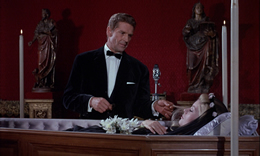
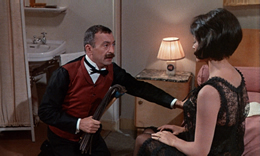 Along with its stellar cast, Belle de Jour is notable for having a director at the peak of his powers in his sole collaboration with cinematographer Sacha Vierny, a world-class master with credits ranging from Last Year at Marienbad to The Cook, the Thief, His Wife & Her Lover. The aethetic here is somewhere between the one-dimensional artifice of classic surrealist paintings and the eerie gloss of fashion magazine chic, with the two mingling most disturbingly in the fantasy and client sequences (which may after all be one and the same). Deneuve is perfectly cast here, developing the fractured blonde persona she developed for Polanski into a damaged soul whose actions lead to a beautifully mysterious final sequence which has spurred debate for decades.
Along with its stellar cast, Belle de Jour is notable for having a director at the peak of his powers in his sole collaboration with cinematographer Sacha Vierny, a world-class master with credits ranging from Last Year at Marienbad to The Cook, the Thief, His Wife & Her Lover. The aethetic here is somewhere between the one-dimensional artifice of classic surrealist paintings and the eerie gloss of fashion magazine chic, with the two mingling most disturbingly in the fantasy and client sequences (which may after all be one and the same). Deneuve is perfectly cast here, developing the fractured blonde persona she developed for Polanski into a damaged soul whose actions lead to a beautifully mysterious final sequence which has spurred debate for decades.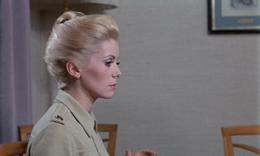 and restored with the championing of Martin Scorsese, while Miramax released them back to art house theaters in the late ‘90s and then onto DVD (in pretty underwhelming non-anamorphic transfers ported over from the briefly available Criterion laserdiscs). At least the Belle de Jour Miramax DVD contains an interesting scholarly commentary with Julie Jones, which has yet to turn up anywhere else. The feature was remastered in Europe a few years later and released on DVD from Studio Canal and its various affiliates like Optimum, with a Region B Blu-Ray following in 2009. Containing the original French language track along with the English, German and Spanish dubs (plus subs in those same languages plus Swedish, Dutch, Danish, Finnish, and Norwegian), the Blu-Ray contains the studio's own commentary by film professor Peter W. Evans, the original English trailer, and a trio of substanital video extras: "The Last Script" (an excellent 94-minute Buñuel documentary), the half-hour "A Story of Perversion or Emancipation?," and the half-hour "Story of a Film," as well as liner notes by Derek Malcolm. The transfer itself looks pretty terrific and easily outclasses even the theatrical reissue prints, though some debris and scratches are still in evidence.
and restored with the championing of Martin Scorsese, while Miramax released them back to art house theaters in the late ‘90s and then onto DVD (in pretty underwhelming non-anamorphic transfers ported over from the briefly available Criterion laserdiscs). At least the Belle de Jour Miramax DVD contains an interesting scholarly commentary with Julie Jones, which has yet to turn up anywhere else. The feature was remastered in Europe a few years later and released on DVD from Studio Canal and its various affiliates like Optimum, with a Region B Blu-Ray following in 2009. Containing the original French language track along with the English, German and Spanish dubs (plus subs in those same languages plus Swedish, Dutch, Danish, Finnish, and Norwegian), the Blu-Ray contains the studio's own commentary by film professor Peter W. Evans, the original English trailer, and a trio of substanital video extras: "The Last Script" (an excellent 94-minute Buñuel documentary), the half-hour "A Story of Perversion or Emancipation?," and the half-hour "Story of a Film," as well as liner notes by Derek Malcolm. The transfer itself looks pretty terrific and easily outclasses even the theatrical reissue prints, though some debris and scratches are still in evidence.